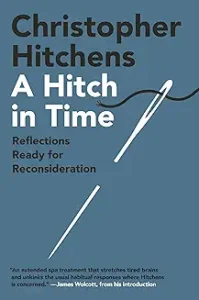A Hitch in Time: Reflections Ready for Reconsideration by Christopher Hitchens 2021
Hitchens, Clive James, Geoff Dyer, and Jonathan Raban comprise my favorite quartet of ironic, brilliant, intellectual, clever, and insightful British essayists. While James focuses largely on the arts, Raban on travel to exotic places, and Dyer on everything that he comes into contact with from a US aircraft carrier to the India city of Varanessi, Hitchens focuses his investigative reporter’s skills and his omnivorous intellectual appetite on current events, primarily the dodgy doings of government in the UK and the US,.
When Hitchens died in 2011, the world of letters lost a fascinating and controversial figure. Born in the UK and educated at Oxford, he emigrated to the US in 1982 and became embroiled in some of the major controversies of our time. An affirmed atheist and anti-cleric, he wrote powerfully in condemnation of the Kennedy’s, Nixon and Kissinger, Clinton and other American politicians who lied, cheated, and otherwise abused their office. His later years were complicated by a perceived rightward movement in his support for the Iraq war and George Bush’s re-election.
Hitchens writes with irony, sarcasm, wit, and a rapier like wit. There is no doubt about what he thinks and who he scorns, and that comes across wonderfully in these 23 essays written between 1983 and 2002 which originally appeared in the London Review of Books. The work is introduced by James Wolcott, Hitchen’s fellow columnist at Vanity Fair in the late 1990’s. Wolcott, no literary slouch himself, refers to Hitchens as ‘the last of the living-large, two-fisted provocateurs, ready to conquer ideological foes and hecklers alike… He could be droll one moment, cauterizing the next, thunder-rumbling as he reached a peroration, an old-school duelist and rhetorician like we ain’t got much of in Amurrica… his adopted country….When it comes to English prose, Hitchens wrote as he spoke, an offhand eloquence that seemed to roll off the wrists, conscripting the listener into his confidences to the melodic clink of ice cubes in the clubby background. His classic roguish, cant-defoliating English style, an inheritance from Hazlitt and similar bravehearts, is fortified by an armory of deep reading and lucid recall, wide acquaintanceship, and a close proximity to many of the major players of the day as they promenaded across the stage.” Wolcott, clearly can write like hell, as well.
I found these essays to be provocative, indeed. His political observations of the American scene included his trashing characterization of the Kennedy years, the Clintons’ playing fast and loose with the truth, the war-criminal behavior of Kissinger and Nixon, the cross-dressing and fear-mongering of J. Edgar Hoover. His cultural and literary commentaries on Tom Wolfe, the Oscars, and Gore Vidal were fascinating. especially his love/hate relationship with his mentor Vidal. Sadly, the essays about British aristocratic figures and UK government screw-ups, while interesting, were of less moment for me. What struck me again and again was the foresight he showed in anticipating today’s neo-fascist developments both in the US and abroad.
A fascinating character, a brilliant commentator and writer, and a man of passionate and courageous views, Hitchens will endure and this volume will be a fine contributor to that body of work.



